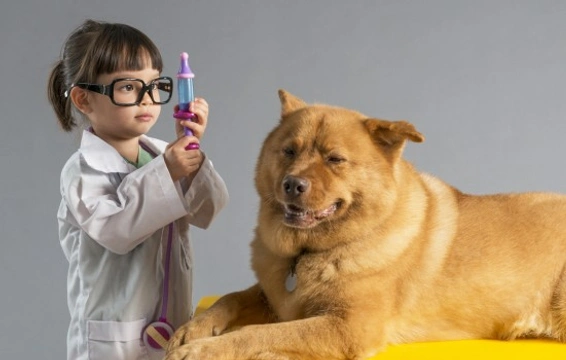
How a Family Dog Can Help a Child's Development
For a long time now, people have known how dogs help keep people fit and healthy. They are wonderful additions to a family and owning a dog can encourage a lot more social interaction in the home. But dogs can also play a very valuable role in children's development and education too. Studies show that having a family dog helps a child develop both their emotional and social skills. It improves their perception of things and this in turn helps enhance a child's ability to learn.
Children Get So Much Out of Caring For a Pet
Kids get so much out of caring for a pet, and although the responsibility should not be totally left up to them, helping to takecare of a family pet means they learn all about self esteem through the praise they receive for doing it well. Children who are allowed to help look after a dog will also acquire strong nurturing skills which they will continue to develop as they grow older into their adult life.
Children also gain a much greater understanding and awareness of nature which they learn through caring for a pet and as such this extends to other animals they come into contact with or see in the wild. This all stands a child in very good stead when they have to deal with other people later on in their lives because it means they have learnt compassion and therefore tend to be more sensitive towards other peoples' feelings.
The Life Experiences A Child Learns From a Family Dog
Children can learn so much about life from a family pet and this includes how to play. However, a young child should never be left unsupervised with a family dog, just in case they get knocked over and hurt. The other thing is that toddlers tend to play rough, and even the nicest natured dog might not agree to being pulled around by their tails or ears. With this said, in a controlled environment younger and older children can learn a lot about how to play by spending time with their family dog, making it a fun learning experience for all concerned.
Kids also learn the basics about body parts and this includes a small amount of sex education because they learn to recognise body parts and what their functions are and they do this in a natural way that causes very little embarrassment to their parents and other people around.
Children also come into contact with death for the first time when a family pet dies. If the situation is well handled by their parents, it sets children up well for coping with the death of a family member or friends later on in their lives. However, it is really important for children to be allowed to grieve the loss of a family dog and to do so in their own time, in their own way.
Dogs Become a Child's Best Friend
Many family dogs become a child's best friend as they are growing up. Their dog always gives them unconditional love when a child needs it most which is usually when they get upset about something or have been told off. Their pet will always help them keep their self esteem when they are feeling bad or low too and this includes when they might be experiencing problems at school.
The Great Work Dogs Do in Schools
A study carried out in an Austrian primary school, showed that having a dog in the classroom had a positive impact on disruptive children. They were quieter and able to concentrate on their lessons without being too boisterous or “attention seeking” when a dog was in the classroom with them. For a long time dogs have been introduced to schools where children with learning difficulties or autism are taught, and their presence proved to be enormously beneficial to the pupils.
The Wonderful Work Dogs Do In Children's Hospitals
Nobody likes hospitals and this is especially true of young children because they are very scary places to have to spend any time in. However, introducing a dog into a hospital environment has proved to have a superb calming effect on children who are anxious and scared. Dogs have a positive impact on children who are waiting to undergo any sort of treatment, taking their minds off what's ahead of them in a very positive and helpful way.
Young Children Need to be Taught How to Behave Around Dogs
Very often a child has a fear of dogs because of a bad experience they had or it could even be because one or both of their parents are scared of dogs. Helping a child overcome their fear is something that needs to be handled very delicately and gently. Very young children need to be taught how to behave around a family pet whether it's a friend's dog or their own. It is a massive learning curve for a child to understand how to stroke a dog nicely and it takes time and lots of supervision from parents. but once a child understands, there is no turning back and a strong bond will form that will last for a very long time between a dog and a child.
Conclusion
Dogs make wonderful family pets which many children think of as their “best friend”. A dog will always be there for a child, teaching them so much about life, about nature and the great outdoors. Children who grow up in homes where they help care for a family dog, learn from an early age how to nurture the things they love and the praise they get for doing things well, goes a long way in helping a child develop strong self esteem – all in all sharing your home with a dog has lots of benefits which includes helping a child's development and education.



